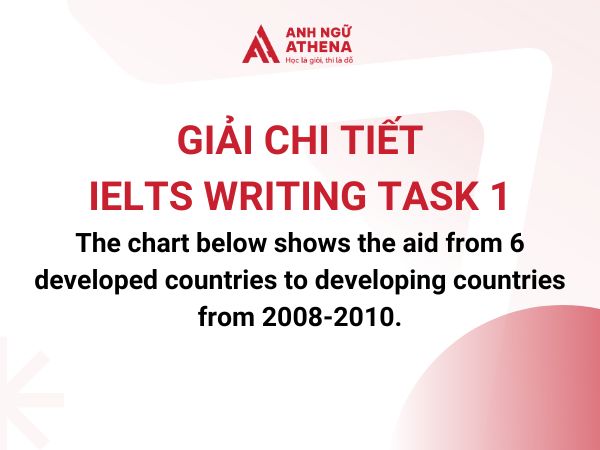Đề bài
Some people think that if a country is already rich, any addition in economic wealth does not make its citizens happier. Do you agree or disagree?

Phân tích đề
Dạng bài: Argumentative/Agree or Disagree with an argument
Keywords: a country is already rich/addition in economic wealth/not make its citizens happier
Yêu cầu của đề
- Đề đưa ra nhận định rằng nếu một quốc gia đã giàu có sẵn, bất cứ sự tăng trưởng nào về kinh tế cũng không khiến người dân của quốc gia đó hạnh phúc hơn
- Đề yêu cầu người viết trình bày quan điểm đồng ý hoặc không đồng ý với quan điểm trên
Brainstorm ideas
Why would additional economic wealth not make a wealthy country’s citizens happier?
- Diminishing Returns of Material Wealth: Once basic needs like food, shelter, and safety are met, the impact of additional material possessions on happiness tends to diminish. People may experience a sense of contentment or satisfaction, but further wealth accumulation may not lead to significantly greater happiness.
- Materialism and Consumerism: Focusing on material possessions and consumerism can lead to dissatisfaction and unhappiness. People may become preoccupied with acquiring the latest goods or status symbols, leading to a sense of emptiness or unfulfillment.
- Psychological Factors: Factors like stress, anxiety, depression, and social isolation can significantly impact happiness, regardless of a person's economic circumstances. Even in wealthy countries, individuals may face personal challenges that affect their emotional well-being.
Why would additional economic wealth make a wealthy country’s citizens happier?
- Improved Standard of Living: Increased wealth can lead to a higher standard of living. This includes factors like better housing, access to quality healthcare, education, and leisure activities. These improvements can contribute to a greater sense of security, comfort, and overall well-being.
- Better Public Services: Increased economic resources can be allocated to improve public services such as infrastructure, education, and healthcare. These improvements can benefit the entire population and contribute to a higher quality of life.
Dàn bài
Introduction
- Paraphrase the topic
- Briefly state the writer’s viewpoint (Agree or disagree with the argument)
Body 1. Why would additional economic wealth not make a wealthy country’s citizens happier?
- Sufficient material wealth would lead to a decreasing desire for possessions over time
- Factors like stress, anxiety, depression, and social isolation can significantly impact happiness, regardless of a person's economic circumstances.
Body 2. Why would additional economic wealth make a wealthy country’s citizens happier?
- Accumulating material wealth means increasingly improved infrastructure and facilities
- Increased wealth can lead to a higher standard of living. This includes factors like better housing, access to quality healthcare, education, and leisure activities.
Conclusion
- Summarize the writer’s presented arguments
- Re-state the writer’s viewpoint on the phenomenon
Sample
The notion that economic growth provides diminishing returns for happiness in affluent nations has gained traction in recent years. Whilst it is undeniable that material wealth alone does not guarantee citizens’ contentment, I contend that continued economic development can still yield significant benefits for a country's citizenry. Beyond the mere accumulation of wealth, economic progress can foster a myriad of positive outcomes that enhance overall well-being.
While economic growth can provide tangible benefits, there are also limitations to its ability to prolong happiness in affluent societies. One argument is that as individuals accumulate sufficient material wealth, the desire for possessions may diminish with time. This phenomenon, often referred to as the "hedonic treadmill", suggests that people quickly adapt to new levels of income and consumption, leading to a return to baseline levels of happiness. Additionally, psychological factors such as stress, anxiety, depression, and social isolation can significantly impact well-being, regardless of economic circumstances. Even in wealthy nations, individuals may face personal challenges that affect their emotional state, ultimately overshadowing the positive effects of material wealth.
On the other hand, accumulating material wealth often translates into significant improvements in infrastructure and facilities. This can manifest in various forms, such as upgraded transportation systems, enhanced public spaces, and expanded access to essential services. For instance, a well-funded economy can facilitate the development of efficient public transportation networks, reducing commuting times and improving quality of life. Additionally, increased economic resources can be allocated to modernize healthcare facilities, ensuring that citizens have access to high-quality medical care at a reasonable cost. Such enhancements contribute to a greater sense of well-being and overall satisfaction.
In conclusion, while the relationship between economic growth and personal happiness is complex and multifaceted, it is evident that economic development plays a significant role in ameliorating well-being even in affluent societies settings. By improving infrastructure, creating opportunities, and fostering a sense of progress, economic growth is attributable to a more fulfilling and satisfying life for citizens. Hence, acknowledging the importance of both material factors and spiritual values is essential for grasping the intricate interplay between economics and human flourishing.
Wordcount: 349 words
Vocab
| Từ vựng | Nghĩa tiếng Việt |
| affluent /ˈæfluənt/ (adj) | giàu có |
| gain traction /ɡeɪn ˈtrækʃᵊn/ (phrase) | thu hút sự chú ý |
| citizenry /ˈsɪtɪzᵊnri/ (n) | người dân |
| hedonic treadmill /hiːˈdɒn.ɪk ˈtrɛdmɪl/ (n) | bánh xe hạnh phúc |
| baseline level /ˈbeɪslaɪn ˈlɛvᵊl/ (n) | mức cơ bản |
| overshadow /ˌəʊvəˈʃædəʊ/ (v) | làm lu mờ |
| translate into /trænzˈleɪt ˈɪntuː/ (phrasal verb) | biến thành |
| manifest /ˈmænɪfɛst/ | biểu hiện |
| sense of well-being /sɛns ɒv ˌwɛlˈbiːɪŋ/ | cảm giác hạnh phúc |
| multifaceted /ˌmʌltɪˈfæsɪtɪd/ | đa chiều |
| sense of progress /sɛns ɒv ˈprəʊɡrɛs/ | cảm giác phát triển |
| intricate /ˈɪntrɪkɪt/ | phức tạp |
Dịch bài
Khái niệm cho rằng tăng trưởng kinh tế mang lại lợi ích giảm dần cho hạnh phúc ở các quốc gia giàu có đã thu hút được sự chú ý trong những năm gần đây. Mặc dù không thể phủ nhận rằng sự giàu có vật chất đơn thuần không đảm bảo sự hài lòng của công dân, tôi cho rằng sự phát triển kinh tế tiếp tục vẫn có thể mang lại những lợi ích đáng kể cho dân cư của một quốc gia. Ngoài việc tích lũy của cải đơn thuần, tiến bộ kinh tế có thể thúc đẩy vô số kết quả tích cực giúp nâng cao phúc lợi tổng thể.
Trong khi tăng trưởng kinh tế có thể mang lại lợi ích hữu hình, cũng có những hạn chế đối với khả năng kéo dài hạnh phúc của nó trong các xã hội giàu có. Một lập luận cho rằng khi cá nhân tích lũy đủ của cải vật chất, mong muốn sở hữu có thể giảm dần theo thời gian. Hiện tượng này, thường được gọi là "bánh xe hạnh phúc", cho thấy mọi người nhanh chóng thích nghi với mức thu nhập và tiêu dùng mới, dẫn đến việc quay trở lại mức độ hạnh phúc cơ bản. Ngoài ra, các yếu tố tâm lý như căng thẳng, lo lắng, trầm cảm và cô lập xã hội có thể ảnh hưởng đáng kể đến hạnh phúc, bất kể hoàn cảnh kinh tế. Ngay cả ở các quốc gia giàu có, cá nhân có thể phải đối mặt với những thách thức cá nhân ảnh hưởng đến trạng thái cảm xúc của họ, cuối cùng che mờ những tác động tích cực của của cải vật chất.
Mặt khác, tích lũy của cải vật chất thường dẫn đến những cải thiện đáng kể về cơ sở hạ tầng và tiện nghi. Điều này có thể thể hiện dưới nhiều hình thức khác nhau, chẳng hạn như hệ thống giao thông nâng cấp, không gian công cộng được cải thiện và mở rộng quyền truy cập vào các dịch vụ thiết yếu. Ví dụ, một nền kinh tế được đầu tư tốt có thể tạo điều kiện cho sự phát triển của các mạng lưới giao thông công cộng hiệu quả, giảm thời gian đi lại và cải thiện chất lượng cuộc sống. Ngoài ra, nguồn lực kinh tế tăng lên có thể được phân bổ để hiện đại hóa cơ sở vật chất y tế, đảm bảo công dân có quyền tiếp cận với chăm sóc y tế chất lượng cao với chi phí hợp lý. Những cải tiến như vậy góp phần vào cảm giác hạnh phúc và hài lòng tổng thể.
Mặc dù mối quan hệ giữa tăng trưởng kinh tế và hạnh phúc cá nhân là phức tạp và đa diện, nhưng rõ ràng là phát triển kinh tế đóng một vai trò quan trọng trong việc cải thiện phúc lợi ngay cả trong các xã hội giàu có. Bằng cách cải thiện cơ sở hạ tầng, tạo cơ hội và thúc đẩy cảm giác tiến bộ, tăng trưởng kinh tế góp phần vào một cuộc sống viên mãn và thỏa mãn hơn cho công dân. Do đó, việc thừa nhận tầm quan trọng của cả yếu tố vật chất và giá trị tinh thần là điều cần thiết để nắm bắt sự tương tác phức tạp giữa kinh tế và sự thịnh vượng của con người.














![[Cập nhật] Lịch thi TOEIC 2025 Quý 1 tại IIG Việt Nam](https://anhnguathena.vn/upload/ban-sao-cua-template-bai-viet-seo-6.png?v=1.0.0)





